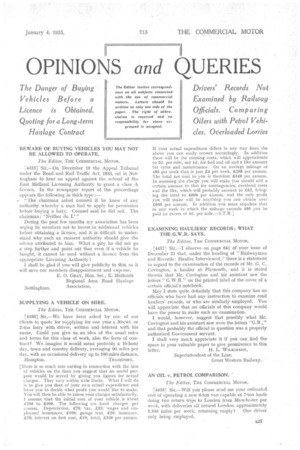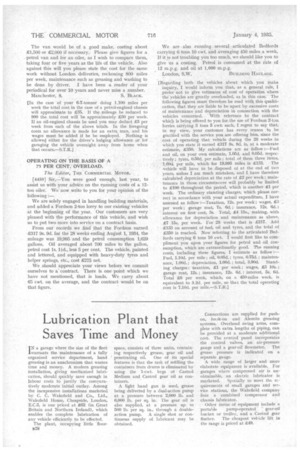OPINIONS and
Page 37

Page 38

If you've noticed an error in this article please click here to report it so we can fix it.
QUERIES
The Danger of Buying Vehicles Before a Licence is Obtained. Quoting for a Longterm Haulage Contract Drivers' Records Not Examined by Railway Officials. Comparing Oilers with Petrol Vehi. des. Overloaded Lorries
BEWARE OF BUYING VEHICLES YOU MAY NOT BE ALLOWED TO OPERATE.
The Editor, THE COMMERCIAL MOTOR.
[4455] Sir,—On December 19 the Appeal Tribunal under the Road and Rail Traffic Act, 1933, sat in Nottingham to hear an appeal against the refusal of the East Midland Licensing Authority to grant a class A licence: In the newspaper report of the proceedings appears the following in thick type:— . "The chairman asked counsel if he knew of any authority whereby a man had to apply for permission before buying a lorry. Counsel said he did not. The chairman : 'Neither do I.'"
During the past few months my association has been urging its members not to invest in additional vehicles before obtaining a licence, and it is difficult to understand why such an eminent authority should give the advice attributed to him. What a pity he did not go a step further and point out that even if a vehicle be bought, it cannot be used without a licence from the appropriate Licensing Authority
shall be glad if you will give publicity to this, as it will save our members disappointment and expense.
E. 0. GRAY, Hon. Sec., E. Midlands Regional Area Road Haulage Nottingham. Association.
SUPPLYING A VEHICLE ON HIRE.
The Editor, THE COMMERCIAL MOTOR.
[4456] Sir,—We have been asked by one of our clients to quote for supplying for one year a 30-cwt. or 2-ton lorry with driver, written and lettered with his name. Could you give us. an idea of the usual rates and terms for this class of work, also the form of contract? We imagine it would mean probably a 10-hour day, town and country delivery, aveiaging 90 miles per day, with an occasional delivery up to 100 miles distance.
Hampton. TRANSPORT.
[There is so much rate cutting in connection with the hire of vehicles on the lines you suggest that no useful purpose would be served by giving you figures for actual charges. They vary within wide limits. What I will do i•3 to give you data of your own actual expenditure and leave you to decide what profit you would like to make. You will then be able to assess your charges satisfactorily. I assume that the initial cost of your vehicle is about £250 to 4300. The following are fixed charges per annum. Depreciation, £75; tax, £25; wages and employees' insurances, £190; garage rent, £20; insurance, £20; interest on first cost, 410; total, £340 per annum. If your actual expenditure differs in any way from the above you can easily correct accordingly. In addition there will be the running costs, which will approximate to 2d. per mile, say ld. for fuel and oil and a like amount for tyres and maintenance. On an average mileage of 480 per week that is just £4 per week, £208 per annum. The total net cost to you is therefore £548 per annum. In assessing the charge you will make you should add a certain amount to that for contingencies, overhead costs and the like, which will probably amount to £52, bringiug the total to £600 per annum, and the only profit you will make will be anything you can obtain over £600 per annum. In addition you must stipulate that in any week in which the mileage exceeds 480 you be paid an excess of 4d. per mile.—S.T.R.] EXAMINING HAULIERS' RECORDS: WHAT THE G.W.R. SAYS.
The Editor, THE COMMERCIAL MOTOR.
[4457] Sir,—I observe on page 641 of your issue of December 21 that, under the heading of "Railwayman and Records : Haulier Interviewed," there is a statement in regard to the examination of the records of Mr. G. C. Covington, a haulier at Plymouth, and it is stated therein that Mr. Covington and his assistant saw the letters " G.W.R." on the printed label of the cover of a certain official's notebook.
May I state quite definitely that this company has no officials who have had any instruction to examine road hauliers' records, or who are similarly employed. You will appreciate that no officials of this company would have the power to make such an examination.
I would, however, suggest that possibly what Mr. Covington and his assistant saw were the letters "G.R.," and that probably the official in question was a properly authorized Government servant.
I shall very much appreciate it if you can find the space in your valuable paper to give prominence to this
letter. H. L. WILKINSON, Superintendent of the Line, Great Western Railway.
AN OIL v. PETROL COMPARISON.
The Editor, THE COMMERCIAL MOTOR.
[4458] Sir,—Will you please send me your estimated cost of operating a new 6-ton van capable of 7-ton loads -doing two return trips to London from Manchester per week, with deliveries all around London, approximately 1,100 miles per week, returning empty? One driver only being employed.
The van would be of a good make, costing about £1,500 or £2,000 if necessary. Please give figures for a petrol van and for an oiler, as I wish to compare them, taking four or five years as the life of the vehicle. Also against this will you please state the cost for the same work without London. deliveries, reckoning 800 miles per week, maintenance such as greasing and washing to be done by driver. I have been a reader of your periodical for over 10 years and never miss a number.
Manchester, 8. S. BLACK.
[In the case of your 6-7-tonner doing 1,100 miles per week the total cost in the case of a petrol-engined chassis will approximate to 235. If the mileage be reduced to 800 the total cost will be approximately 230 per week. If an oil-engined chassis be used you may deduct 25 per week from each of the above totals. In the foregoing costs no allowance is made for an extra man, and his wages must be added if he be employed. Nothing is allowed either for the driver's lodging allowance or for garaging the vehicle overnight away from home when that occurs,—S.T.R.1 •
OPERATING ON THE BASIS OF A 75 PER CENT. OVERLOAD.
The Editor, THE COMMERCIAL MOTOR.
[4459] Sir,–.--You were good enough, last year, to assist us with your advice on the running costs of a 12ton oiler. We now write to you for your opinion of the
following :— •
We are solely engaged in handling building materials, and added a Fordson 2-ton lorry to our existing vehicles at the beginning of the year. Our customers are very pleased with the performance of this vehicle, and wish us to put two more into service on a contract basis.
From our records we .find that the Fordson earned £317 9s. 9d. for the 28 weeks ending August 1, 1934, the mileage was 19,995 and the petrol consumption 1,029 gallons. Oil averaged about 700 miles to the gallon, petrol cost is. 1d., less 5 per cent. The vehicle, painted and lettered, and equipped with heavy-duty tyres and helper springs, etc., cost £275 net.
We should appreciate your views before we commit ourselves to a.' contract. There is one point which we have not mentioned, that is loads. We carry about 65 cwt. on the average, and the contract would be on that figure.
We are • also running several articulated Bedfords carrying 6 tons 10 cwt, and averaging 450 miles a week. If it is not troubling you too much, we should like you to give us a costing. Petrol is consumed at the rate of 12 m.p.g. and oil at 1,000 m.p.g.
London, S.W. BUILDING HAULAGE.
[Regarding both the vehicles about which you make inquiry, I would inform you that, as a general rule, I prefer not to give estimates of cost of operation where the vehicles are greatly overloaded, as in this case. The following figures must. therefore be read with this qualification, that they are liable to be upset by excessive costs of maintenance and depreciation in connection with the vehicles concerned. With reference to the contract which is being offered to you for the use of Fordson 2-toa lorries carrying 3 tons 5 cwt. each, I regret to say that, in my view, your customer has every reason to be gratified with the service you are offering him, since the cost of operating that vehicle during the 28 weeks in which you state it earned 2317 9s. 9d. is, at a moderate estimate, 2.350. My calculations are as follow :—Fuel and oil, on your own estimate, 1.05d. and 0.05d. respectively; tyres, 0.50d, per mile; total of :these three items, 1.60d. per mile, which for 19,995 miles is 2.133. The .vehicle will have to be disposed of at the end of two years, unless I am much mistaken, and I have therefore calculated depreciation at the rate of 22 per week; maintenance in those circumstances will probably be limited to 2100 throughout the period, which is another 21 per week. The ordinary standing charges, which please correct in accordance with your actual expenditure, I have assessed as follow :—Taxation, l2s. per week ; wages, 23 per week ; garage rent, 7s. 6d.; insurance, 12s. 6d.: interest on first cost, 3s. Total, £4 15s., making, with allowance for depreciation and maintenance as above, 27 15s. per week. For 28 weeks that is £217. Add 2133 on account of fuel, oil and tyres, and the total of 2350 is reached. Now referring to the articulated Bedfords carrying 6 tons 10 cwt. I would first like to compliment you upon your figures for petrol and oil consumption, which are extraordinarily good. The running costs, including these figures, I estimate as follow :— Fuel, 1.10d. per mile ; oil, 0.05d.; tyres, 0.75d.; mainten ance, 1.00d.; depreciation, 1.00d.; total, 3.90d. Standing charges: taxation, 21 per week ; wages, 23 10s.; garage rent, I2s.; insurance, 12s. 6d.; interest, 5s. 6d. Total 26 per week, which, on a 450-miles week, is equivalent to 3.2d. per mile, so 'that the total operating cost is 7.10d. per mile.—S.T.R.1




















































































